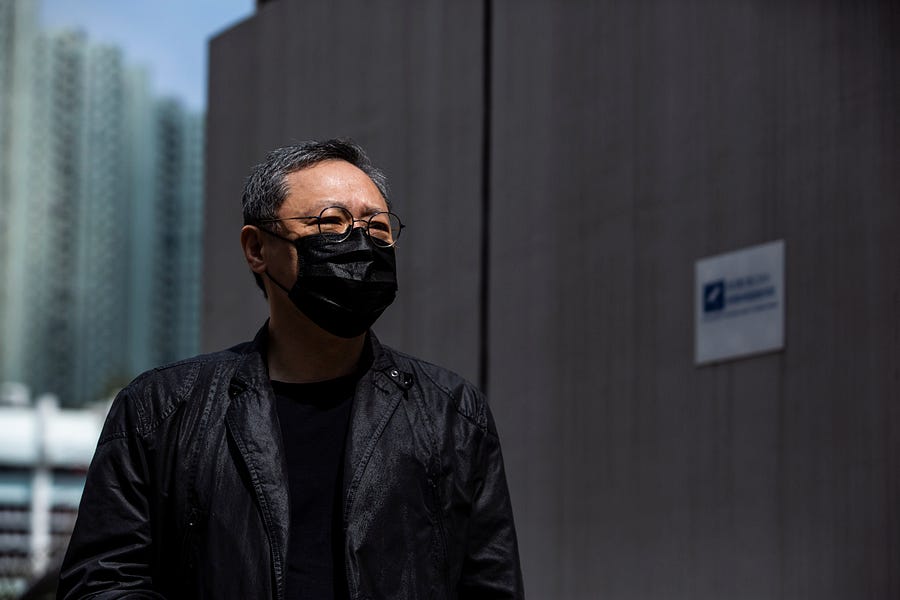On Sunday, 47 Hong Kong pro-democracy politicians and activists were charged with conspiracy to commit subversion. Their offense? Organizing an informal primary for pro-democracy candidates last July to decide which of them would contest legislative council elections in November, which were later postponed. They include Benny Tai, Lester Shum, Owen Chow—too many to list in this piece.
Those charged this weekend are the largest group of prosecutions so far under the national security law imposed on Hong Kong by Beijing last July, just a few days before the democracy primary. Possible sentences include life imprisonment. Virtually the entire leadership of the Hong Kong democracy movement—from the older generation inspired by the June 4, 1989, massacre of democracy protesters on the mainland, to the leaders of the Umbrella movement of 2014 and the 2019 “leaderless” protests against a proposed extradition law are in jail or on trial.
That includes Jimmy Lai, the publisher of Apple Daily, the only pro-democracy Chinese language newspaper in the city. Lai is already in jail, charged under the national security law with “foreign collusion.” Lai is also on trial on charges related to an “unauthorized demonstration” along with the barristers Martin Lee, Margaret Ng, the labor leader Lee Cheuk-yan, the former legislator Cyd Ho, the solicitor Albert Ho, and the veteran protester Leung Kwok-hung.
Hong Kong’s legal system is being shattered. Specialized units have been formed within the prosecution service and police to focus on national security offenses. A government hotline encourages citizens to report on violations. Those who try to preserve the rule of law, like Paul Harris, the new head of the Hong Kong bar association, a U.K. citizen who has practiced for decades in the city, have been attacked by Beijing officials for supposedly violating “the bottom line” of “one country, two systems.”
Even before Hong Kong’s 1997 handover to Communist rule, the China scholar Steve Tsang explained that what Beijing meant by its “promises” was not what the West wanted to believe. Beijing, he wrote, had no interest in preserving Hong Kong’s attributes for its people’s sake. Instead, according to Tsang, the CCP’s “obsession” with gaining sovereignty was mitigated only by the imperative to benefit economically from Hong Kong as a base for financial and legal systems that facilitate investment in the mainland. An independent judiciary has “no inherent value to PRC leaders.” As for democracy, “a pipe dream,” Tsang concluded.
The CCP has always planned to rule Hong Kong through local proxies it deemed “patriotic.” This litmus test was always a force in Hong Kong life and politics. Now it is dominant. On February 22, Beijing unveiled a plan to end democrats’ participation in politics and government. Xia Baolong, head of the State Council’s Hong Kong and Macau Affairs Office, a hardliner known for destruction of Christian churches on the mainland, signaled the danger hanging over democrats and activists. Patriots are those who do what Beijing wants. “Those who stand in opposition to patriots are destroyers of the ‘one country, two systems’ principle, and they should not be allowed to take a share of the Hong Kong special administrative region’s political power. Not now, not ever.”
Some 600,000 Hong Kongers voted in the July 2020 primary. It is not far-fetched to imagine they too will face sanction for daring to exercise their rights peacefully. They, and the democrats charged over the weekend, were engaging in peaceful, constructive activities in pursuit of democratic rights. In Beijing’s view, this is an existential threat to the Party.
Having read Mr. Tsang’s analysis when it was published, I doubted the CCP would leave Hong Kong alone, to enjoy the rule of law and to develop and expand the partial democracy left behind by the British. Having followed U.S. Hong Kong policy since the 1990s, I also came to doubt the promises by American officials that Washington would “stand up” for or “defend” Hong Kong. The latter realization has been tougher to take.
With the imposition of the national security law, Hong Kong democrats face fates similar to dissidents on the mainland. That includes being disappointed by America’s failure to champion them. In 1998, leaders of the tiny China Democracy Party hoped that registering just before the visit of President Bill Clinton would give them a measure of protection. They were wrong. They went to jail. By then, Clinton had already abandoned human rights as a condition for most favored nation status. Later, he worked for passage of permanent MFN for China, partly by arguing that the CCP efforts to control the Internet would be “like nailing Jell-o to the wall.”
My friends in Hong Kong lacked confidence in the Joint Declaration and the CCP-drafted basic law, but as one told me, “they’re all we have.” Washington has no such excuse. Fortunately, if belatedly, the Trump administration abandoned the premise that Beijing valued Hong Kong’s attributes, imposing visa bans and financial sanctions on officials responsible for attacking Hong Kong’s democracy, rule of law, and press freedom. Targeted officials laughed them off. China’s leaders have a much bigger agenda: pushing the U.S. out of Asia and advancing new anti-democratic norms that such measures don’t affect. The Biden administration will have to come up with a new approach, or spend its term lamenting the downward spiral of repression in Hong Kong.
Ellen Bork, a contributing editor at American Purpose, has worked in support of democracy and the rule of law since the 1990s.






Please note that we at The Dispatch hold ourselves, our work, and our commenters to a higher standard than other places on the internet. We welcome comments that foster genuine debate or discussion—including comments critical of us or our work—but responses that include ad hominem attacks on fellow Dispatch members or are intended to stoke fear and anger may be moderated.
With your membership, you only have the ability to comment on The Morning Dispatch articles. Consider upgrading to join the conversation everywhere.